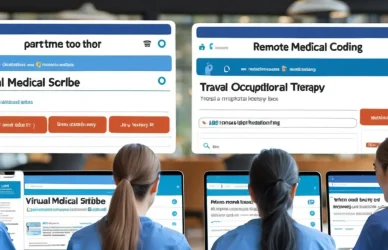The healthcare industry in the USA is booming and offers diverse and rewarding career paths[1]. Whether you’re a nurse, medical assistant, or pharmacy technician, obtaining certifications can significantly enhance your resume and open doors to exciting opportunities. Certifications validate your specialized knowledge and skills, demonstrating your commitment to professional development and patient care[2]. In this article, we’ll explore the top certifications for various healthcare professions in the USA, providing valuable insights into their requirements, benefits, costs, and training programs.
Top Certifications for Nurses in the USA
Nursing is a cornerstone of the healthcare system, and specialized certifications can help nurses advance their careers and provide better patient care. For those just starting their nursing careers, certifications like BLS and ACLS are highly valuable and can give you a head start[3]. Here are some of the top certifications for nurses in the USA:
- Certified Emergency Nurse (CEN): Offered by the Board of Certification for Emergency Nursing (BCEN), this certification validates a nurse’s expertise in providing emergency care. CEN-certified nurses are better prepared for lifelong learning, professional development, and overall career success[4]. While there are no minimum experience requirements, the Emergency Nurses Association (ENA) recommends two years of experience in emergency nursing before taking the exam[5].
- Critical Care Registered Nurse (CCRN): Administered by the American Association of Critical-Care Nurses (AACN), the CCRN certification is for nurses working with acutely/critically ill adult patients. To be eligible, nurses need 1,750 hours of direct bedside care of such patients during the previous two years, with at least 875 of those hours accrued in the most recent year preceding the exam application[5].
- Family Nurse Practitioner (FNP): Offered by the ANCC, this certification allows registered nurses to provide primary care to patients across their lifespan. FNPs often work in primary care settings. Requirements include an MSN degree or higher and a minimum of 500 clinical hours of supervised direct patient care[4].
- Certified Nurse Educator (CNE): The National League for Nursing (NLN) offers this certification for nurses who want to educate future nurses in various settings, including universities and hospitals. CNEs play a crucial role in shaping the next generation of nurses[4].
- Progressive Care Certified Nurse (PCCN): Also administered by the AACN, this certification is for nurses who care for acute adult patients who need a higher level of care but are not in the intensive care unit. PCCN-certified nurses possess specialized knowledge and skills in managing the complex needs of these patients[4].
- Oncology Certified Nurse (OCN): Offered by the Oncology Nursing Certification Corporation, this certification allows nurses to demonstrate expertise in providing care to cancer patients. With an OCN certification, nurses can use the most updated research and trends to help advance clinical treatments for patients with cancer. Requirements include 2,000 hours of adult oncology nursing practice, two years of RN experience, and 10 hours of continuing oncology education[4].
- Certified Perioperative Nurse (CNOR): Administered by the Competency and Credentialing Institute, this certification requires a minimum of two years and 2,400 hours of perioperative experience. The CNOR credential is held by more than 40,000 nurses across the globe, demonstrating its wide recognition and value[4].
- Certified Medical-Surgical Registered Nurse (CMSRN): Offered by the Academy of Medical-Surgical Nurses, this certification validates a nurse’s skills in caring for adult patients in medical-surgical settings. Med-surg nurses can build and demonstrate commitment, confidence, and credibility through this certification, which became available more than two decades ago. More than 35,000 nurses in the specialty are certified4.
- Certified Neuroscience Registered Nurse (CNRN): This certification validates expertise in providing care to patients with neurological conditions, such as stroke, traumatic brain injury, and spinal cord injury[7].
- Certified in Executive Nursing Practice (CENP): This certification from the ANCC is for nurses in leadership and management roles, equipping them with the skills to effectively lead and manage nursing teams and improve healthcare outcomes[8].
- Informatics Nursing Certification (RN-BC): This ANCC certification validates a nurse’s skills in using technology to improve patient care. Informatics nurses play a crucial role in integrating technology into healthcare settings to enhance efficiency, safety, and patient outcomes[8].
In addition to these, nurses can also obtain certifications in specialized areas such as:
- Cardiac nursing: Cardiovascular Registered Nurse – Board Certified (CVRN), Cardiac-Vascular Nursing Certification (CV-BC), Telemetry Certification, Vascular Access Board Certification (VA-BC) [7]
- Emergency room nursing: Sexual Assault Nurse Examiner (SANE), Transport Professional Advanced Trauma Course (TPATC), Trauma Certified Registered Nurse (TCRN) 7
- Intensive and critical care: Cardiac Medicine Subspecialty Certification (CMC), Certified Flight Registered Nurse (CFRN) [7]
- OB-GYN and labor and delivery: Certified Breastfeeding Counselor (CBC), Certification in Electronic Fetal Monitoring (C-EFM), Certified Lactation Counselor (CLC), Registered Nurse Certification in Inpatient Obstetric Nursing (RNC-OB), Registered Nurse Certification in Maternal Newborn Nursing (RNC-MNN) [7]
- Operating room and surgical: Certified Ambulatory Perianesthesia Nurse (CAPA), Certified Ambulatory Surgery Nurse (CNAMB), Certified Nurse Operating Room (CNOR), Certified Post Anesthesia Nurse (CPAN), Registered Cardiovascular Invasive Specialist (RCIS), Registered Nurse – First Assist (RNFA) [7]
- Post-acute care: Ambulatory Care Nursing Certification (AMB-BC), Certified Case Manager (CCM), Certified Dementia Practitioner (CDP), Certified Rehabilitation Registered Nurse (CRRN) [7]
- Wound, skin, and ostomy: Certified Continence Care Nurse (CCCN), Certified Foot Care Nurse (CFCN), Certified Ostomy Care Nurse (COCN), Certified Wound Care Nurse (CWCN), Certified Wound Ostomy Continence Nurse (CWOCN), Certified Wound Specialist (CWS), Wound Care Certified (WCC) [7]
- Other clinical areas: Certified Hyperbaric Registered Nurse (CHRN), Certified Registered Nurse in Ophthalmology (CRNO), HIV Specialist (AAHIVS), Holistic Nursing Certification 7
- Nonclinical areas: Board Certified Nurse Executive – Advanced (NEA-BC), Certified Clinical Documentation Specialist (CCDS), Certified Nurse Manager and Leader (CNML), Nurse Coach Certification (NC-BC), Nurse Executive Certification (NE-BC) [7]
Requirements for Nursing Certifications
The requirements for nursing certifications vary depending on the specific certification. Generally, they include:
- Education: Most certifications require an RN license and may also require a bachelor’s or master’s degree in nursing.
- Experience: Many certifications require a certain number of hours of clinical experience in the specialty area.
- Exams: Candidates must pass a certification exam to demonstrate their knowledge and skills.
For example, the CEN requires no minimum experience, but two years of ER experience is recommended[5]. The CCRN requires 1,750 hours of direct bedside care of acutely/critically ill adult patients in the past two years, with 875 of those hours accrued in the year preceding the application[5]. The FNP requires an MSN degree or higher and 500 clinical hours[4]. It’s important to note that in some states, having a valid, up-to-date Basic Life Support (BLS) certification might be a condition to apply for RN licensure[3].
Benefits of Nursing Certifications
Nursing certifications offer numerous benefits to both nurses and their patients:
- Professional credibility: Certifications validate a nurse’s expertise and commitment to their profession[9].
- Improved patient care: Certified nurses are better equipped to provide high-quality patient care, leading to better patient outcomes and increased patient satisfaction[10]. They also play a crucial role in promoting patient safety by adhering to best practices and staying updated on the latest research and advancements in their field[11].
- Personal satisfaction: Achieving certification can boost a nurse’s confidence and morale, leading to greater job satisfaction and a sense of accomplishment[11]. Some certifications can even allow nurses to explore diverse career paths, such as becoming clinical psychologist assistants[8].
- Career advancement: Certifications can open doors to new opportunities and career paths, such as specialized roles, leadership positions, and higher pay[9]. Employers often prefer or require certified nurses, especially in specialized areas like critical care, giving certified nurses a competitive edge in the job market[6].
Certification vs. Training for Nurses
It’s important to understand the distinction between certification and training for nurses. While both contribute to professional development, they serve different purposes. Certification validates a nurse’s knowledge and skills in a specific area of practice, while training focuses on acquiring new skills or updating existing ones[7]. For example, Advanced Cardiac Life Support (ACLS), Basic Life Support (BLS), and Pediatric Advanced Life Support (PALS) are training programs that equip nurses with essential life-saving skills, while certifications like CEN and CCRN validate their expertise in specific nursing specialties.
RN Certifications vs. APRN Certifications
Another important distinction is between Registered Nurse (RN) certifications and Advanced Practice Registered Nurse (APRN) certifications. RN certifications, such as CEN and CCRN, validate expertise in specific areas of nursing practice. APRN certifications, on the other hand, are for nurses who have completed advanced education and training, such as nurse practitioners and clinical nurse specialists. Examples of APRN certifications include Certified Registered Nurse Anesthetist (CRNA), Family Nurse Practitioner (FNP), and Adult-Gerontology Primary Care Nurse Practitioner Certification (AGPCNP)[7].
Training Programs for Nursing Certifications
Many organizations offer online and in-person training programs to prepare nurses for certification exams. These programs provide comprehensive instruction on the knowledge and skills required for the certification. For example, the American Red Cross offers online, blended, and in-person BLS training courses[12]. ACLS.com offers online ACLS, BLS, PALS, and Neonatal Resuscitation certification courses[13]. eMedCert provides online ACLS, PALS, and BLS certification and recertification courses[14].
Cost of Nursing Certifications
The cost of nursing certifications varies depending on the certifying organization and the specific certification. Some certifications may cost between $100 and $1,000, with renewal fees ranging from $150 to $400[15]. For example, the CEN exam preparation course can cost around $149.99[16]. ACLS and PALS certification courses can cost around $159 each, while BLS certification costs around $109[17].
Top Certifications for Medical Assistants in the USA
Now, let’s delve into the world of pharmacy technicians. Pharmacy technicians play a vital role in dispensing medications and providing support to pharmacists. Here are some of the top certifications for pharmacy technicians in the USA:
- Certified Pharmacy Technician (CPhT): Offered by the PTCB, the CPhT credential is nationally recognized and validates a technician’s expertise in medication management and pharmacy operations[26].
- Certified Compounded Sterile Preparation Technician (CSPT): Also offered by the PTCB, the CSPT certification validates a technician’s expertise in preparing sterile medication compounds[26].
- Certified Pharmacy Technician (CPhT-Adv): Offered by the NHA, the CPhT-Adv credential represents an advanced level of certification for pharmacy technicians with specialized roles and experience[26].
Requirements for Pharmacy Technician Certifications
The requirements for pharmacy technician certifications vary depending on the specific certification. Generally, they include:
- Education: Most certifications require a high school diploma or equivalent and completion of a pharmacy technician training program.
- Experience: Some certifications may require a certain amount of work experience in the field.
- Exams: Candidates must pass a certification exam to demonstrate their knowledge and skills.
For example, the CPhT requires a high school diploma, completion of a PTCB-recognized training program, and passing the PTCE exam[27]. The CSPT requires an active CPhT certification and 40 hours of sterile compounding training[28]. The CPhT-Adv requires an active PTCB CPhT, three years of work experience, and four PTCB Assessment-Based Certificates or three Certificate Programs plus the CSPT Certification[29]. The PTCE exam, required for the CPhT certification, has a 71% pass rate[30].
Benefits of Pharmacy Technician Certifications
Pharmacy technician certifications offer numerous benefits to both technicians and their patients:
- Professional validation: Certifications demonstrate a technician’s commitment to the profession and adherence to high standards of practice[26].
- Increased job opportunities: Certified pharmacy technicians are often preferred by employers, giving them a competitive edge in the job market[26]. Many employers might even require pharmacy technicians to be PTCB or CPhT certified31. Getting certified can lead to better job opportunities and a higher salary in this rapidly growing field[30].
- Higher earning potential: Certified technicians may have a higher earning potential compared to non-certified technicians[26].
- Career advancement: Certifications can open doors to new opportunities and career paths, such as specialized roles in sterile compounding or leadership positions[26].
- Improved job performance: Certification programs enhance a technician’s knowledge and skills, leading to improved job performance and a greater focus on patient safety[26].
Training Programs for Pharmacy Technician Certifications
Many institutions offer online and in-person training programs to prepare students for pharmacy technician certification exams. These programs provide comprehensive instruction on the knowledge and skills required for the certification. Different training programs may focus on preparing you for a specific exam, such as the PTCE or ExCPT[32]. For example, MedCerts offers a 16-week online program that prepares students for the CPhT exam[33]. Stepful offers a 4-month online pharmacy technician program that prepares students for the NHA CPhT certification exam[34]. HealthCareer Certs offers a hybrid program that combines online learning with an externship[35].
Cost of Pharmacy Technician Certifications
The cost of pharmacy technician certifications varies depending on the certifying organization and the specific certification. For example, the CPhT exam costs $129[36]. The CSPT exam costs $149 plus a $50 application fee[31]. The CPhT-Adv has no separate exam fee but requires earning other certificates[37].
Conclusion
In today’s competitive healthcare industry, certifications are essential for professionals seeking to advance their careers and provide the best possible patient care. Whether you’re a nurse, medical assistant, or pharmacy technician, obtaining certifications can validate your expertise, increase your earning potential, and open doors to new opportunities. The trend of employers preferring or requiring certified healthcare professionals is on the rise, making certifications even more valuable. By carefully considering your career goals and the requirements of each certification, you can make informed decisions to boost your resume and achieve your professional aspirations. Continuous professional development through certifications is crucial for staying updated on the latest advancements and best practices in healthcare, ultimately contributing to better patient outcomes and a more fulfilling career.
Works cited
- Benefits of Getting Pharm Tech Certification | PharmTechs.org – pharmacy technician education, accessed February 20, 2025, https://www.pharmtechs.org/pharmacy-technician-certification/
- Elevate Your Nursing Career: Top 5 Nursing Certifications to Pursue – Neethus Academy, accessed February 20, 2025, https://neethusacademy.com/top-five-nursing-certifications-for-your-career/
- Top Nursing Certifications for RNs to Get in 2024 – Nightingale College, accessed February 20, 2025, https://nightingale.edu/blog/nursing-certifications.html
- 24 Nursing Certifications To Boost Your Career, accessed February 20, 2025, https://www.nurse.com/blog/24-nursing-certifications-to-boost-your-career/
- ER Nurse Certifications – Emergency Nursing – All Nurses, accessed February 20, 2025, https://allnurses.com/er-nurse-certifications-t494767/
- Essential Nurse Certifications to Advance Your Career – Favorite Healthcare Staffing, accessed February 20, 2025, https://www.favoritestaffing.com/blog/essential-nurse-certifications-the-best-certifications-to-advance-your-nursing-career
- What Are the Best RN Certifications for Your Career? – IntelyCare, accessed February 20, 2025, https://www.intelycare.com/career-advice/what-are-the-best-rn-certifications-for-your-career/
- Best Nursing Certifications to Consider for 2025 – Research.com, accessed February 20, 2025, https://research.com/degrees/best-nursing-certifications
- CMA vs RMA vs CCMA: Difference Between These Medical Assistant Certifications – Stepful, accessed February 20, 2025, https://www.stepful.com/post/medical-assistant-vs-certified-medical-assistant-vs-registered-medical-assistant
- Benefits of Nursing Certification: Why Get Certified in Nursing – Maryville University, accessed February 20, 2025, https://nursing.maryville.edu/blog/benefits-of-nursing-certification.html
- Certification Benefits Patients, Employers and Nurses – AACN, accessed February 20, 2025, https://www.aacn.org/certification/value-of-certification-resource-center/nurse-certification-benefits-patients-employers-and-nurses
- BLS Training | Get BLS Certification – American Red Cross, accessed February 20, 2025, https://www.redcross.org/take-a-class/bls
- Online ACLS Nursing Accreditation Classes, accessed February 20, 2025, https://acls.com/accreditation/nursing/
- Certifications for Nurses – eMedCert, accessed February 20, 2025, https://emedcert.com/certifications-for-nurses
- Complete List of Nursing Certifications – Stability Healthcare, accessed February 20, 2025, https://stabilityhealthcare.com/resources/nursing-certifications/
- Certified Emergency Nurse Certification – CEN® Exam Prep Package with Practice Test & NSN Access – PESI.com, accessed February 20, 2025, https://catalog.pesi.com/sales/hc_c_076015_certifiedemergencynurse_100218_organic-42870
- Certification Pricing at Save a Life by NHCPS – Savealife.com, accessed February 20, 2025, https://nhcps.com/certification-pricing/
- Top Medical Assistant Certifications to Advance Your Career – Stepful, accessed February 20, 2025, https://www.stepful.com/post/top-medical-assistant-certifications-to-advance-your-career
- Medical Assistant Certifications: CMA, RMA, NCMA—Which One is Right for You?, accessed February 20, 2025, https://www.medicalassistantonline.org/articles/choosing-ma-certifications/
- Certified for Success: 10 Medical Assistant Credentials That Matter, accessed February 20, 2025, https://www.eaglegatecollege.edu/blog/the-best-certifications-for-your-medical-assistant-career/
- Exploring the Top 7 Medical Assistant Certifications for Your Career, accessed February 20, 2025, https://medassisting.org/exploring-the-top-7-medical-assistant-certifications-for-your-career/
- Medical Assistant Certification | CMA, RMA, NCMA, CCMA Certification, accessed February 20, 2025, https://www.medassistantedu.org/certification/
- 10 Best Online Certified Medical Assistant Programs – Nurse.org, accessed February 20, 2025, https://nurse.org/healthcare/online-medical-assistant-programs/
- Online Medical Assistant Program | CCMA Certification – Stepful, accessed February 20, 2025, https://www.stepful.com/medical-assistant
- Online: Medical Assistant Certification (CCMA) – Phlebotomy Career Training, accessed February 20, 2025, https://phlebotomycareertraining.com/program/online-medical-assistant-certification/
- Best Certifications for Pharmacy Techs in 2025 (Ranked) – Teal, accessed February 20, 2025, https://www.tealhq.com/certifications/pharmacy-tech
- Certified Pharmacy Technician (CPhT) – Credentials – PTCB, accessed February 20, 2025, https://www.ptcb.org/credentials/certified-pharmacy-technician
- Top 5 Certification Programs to Advance Your Pharmacy Technician Career, accessed February 20, 2025, https://nwsc.edu/top-5-certification-programs-to-advance-your-pharmacy-technician-career/
- How do I earn the CPhT-Adv Certification?, accessed February 20, 2025, https://ptcb.zendesk.com/hc/en-us/articles/360053339051-How-do-I-earn-the-CPhT-Adv-Certification
- 3 Best Pharmacy Technician Certification (CPhT) Exam Study Guides – MedCerts, accessed February 20, 2025, https://medcerts.com/blog/top-3-pharmacy-tech-certification-study-guides-cpht
- Best Pharmacy Technician Certifications to Strengthen Your Career – Medical Hero, accessed February 20, 2025, https://medicalhero.com/pharmacy-technician-certifications-to-strengthen-your-career/
- Pharmacy Technician Certification Options (PTCB, NHA, CPhT, & More) – Stepful, accessed February 20, 2025, https://www.stepful.com/post/pharmacy-technician-certifications
- Online CPhT Pharmacy Technician Certification Course – MedCerts, accessed February 20, 2025, https://medcerts.com/certifications/healthcare/cpht-certified-pharmacy-technician-certification
- Online Pharmacy Technician Certification Program | 4 Months – Stepful, accessed February 20, 2025, https://www.stepful.com/pharmacy-tech
- Online Pharmacy Technician Training Certifications – HealthCareer Certs, accessed February 20, 2025, https://www.healthcareercerts.org/pharmacy-tech/
- Cost of Pharmacy Technician School & Certification – Stepful, accessed February 20, 2025, https://www.stepful.com/post/pharmacy-technician-school-certification-cost
- Advanced Certified Pharmacy Technician CPhT-Adv – BPTS, accessed February 20, 2025, https://bpts.org/credentials/advanced-certified-pharmacy-technician-cpht-adv/






